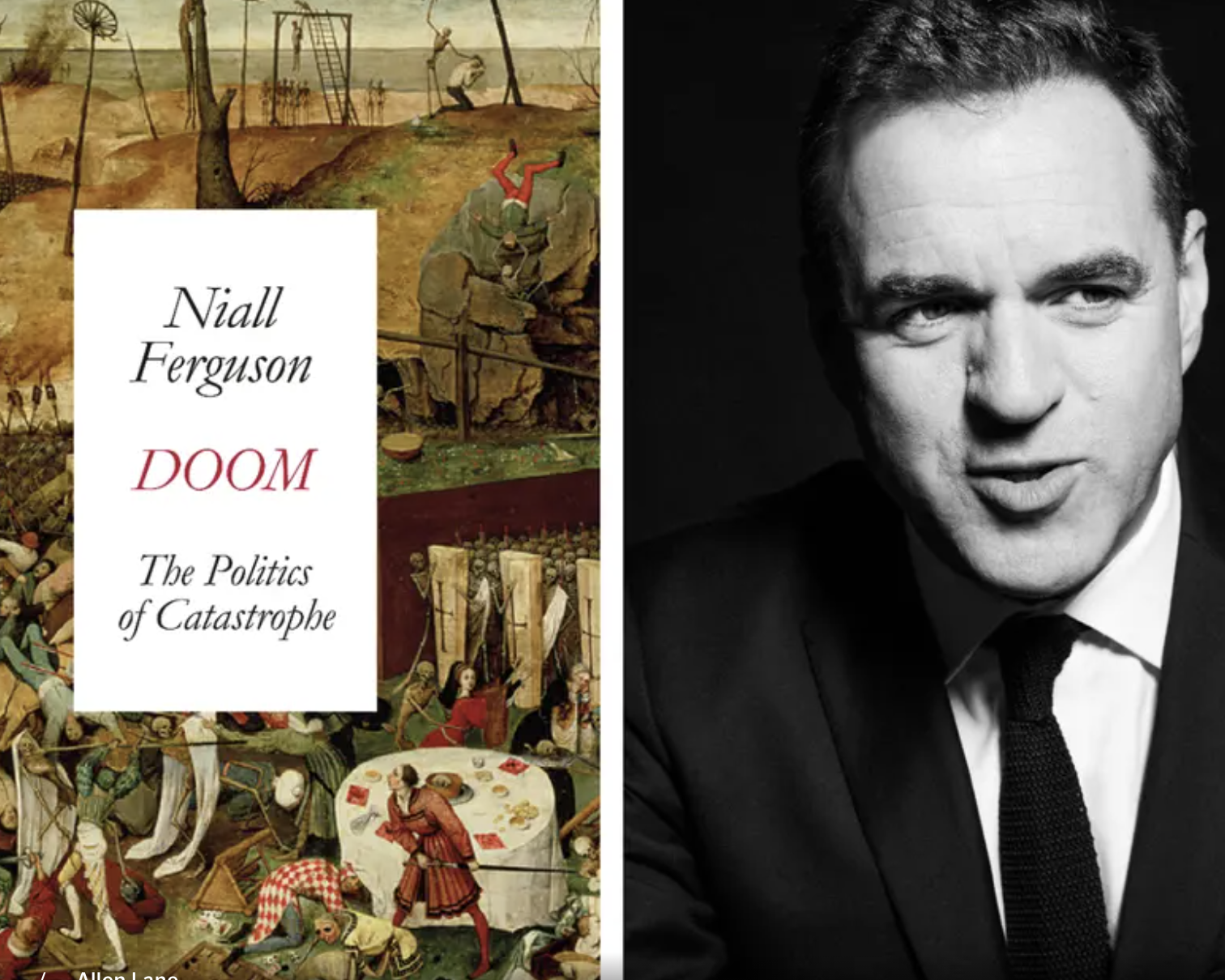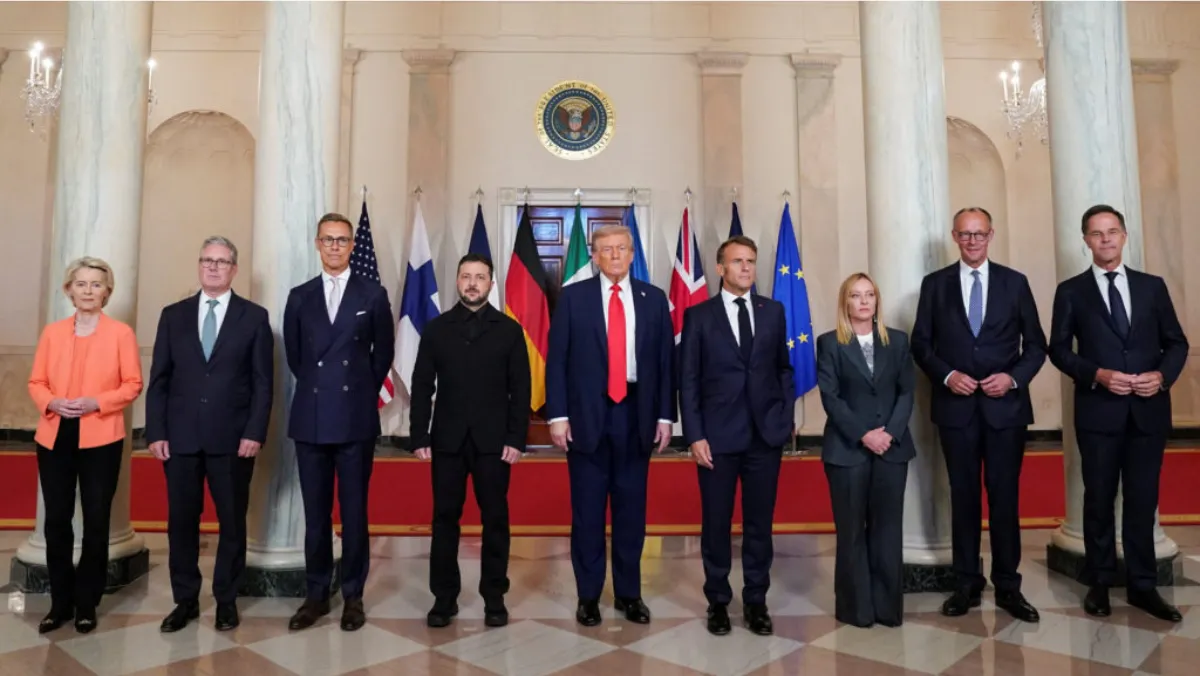
Doom: The Politics of Catastrophe by Niall Ferguson review
(Evening Standard) – From plagues and volcanic eruptions to the current Covid pandemic, mankind has always been faced with catastrophes.
Thought Leader: Niall Ferguson

President Donald J. Trump’s meeting with top European leaders at the White House Monday is a clear signal of the scale of Russian President Vladimir Putin’s strategic disaster.
Putin’s invasion of Ukraine has been long and costly. His unending lies have hurt his diplomatic credibility. His vicious attacks on civilians, kidnapping of Ukrainian children, and other manifestations of brutality have not been seen since World War II. Putin’s barbarism has brought the Western alliance back together. If anything, the West’s resolve to contain – and if necessary defeat – Russian aggression has strengthened.
President Trump’s steady leadership on the world stage has only been helped by Putin’s continued belligerence and megalomania.
When Sergey Lavrov, Putin’s foreign affairs minister, wore a sweatshirt with the letters CCCP (the USSR’s Cyrillic abbreviation) at the Alaskan meeting, it was an arrogant and deliberately offensive reminder of Putinism’s the real goal – the rebuilding of the Soviet Empire.
Remember, Putin said years ago that the collapse of the Soviet Union was the greatest tragedy of the 20th century. His KGB training engrained in him serious loyalty to the communist empire. It is deep and sincere. However, his devotion to that failed society has also become a foundation for disastrous policies.
I encountered this determination from an old communist true believers in 1993 when I was a member of a congressional delegation to the new post-Soviet Russia. In a meeting with then-Vice President Alexander Rutskoy (a former Soviet Air Force General), I mentioned that the huge wall map behind him was the old Soviet Union. He smiled and told me, “Yes, it will be like that again.” Since that map included Ukraine, Belarus, Latvia, Lithuania, Estonia, Moldova, Georgia, Armenia, Azerbaijan, Kazakhstan, Uzbekistan, Turkmenistan, Kyrgyzstan, and Tajikistan, it was a sobering comment.
Back then, I thought it was an interesting attitude from a failed past. Now, with the rise of Putin, it’s clear that attitude has become policy.
The crown jewel in rebuilding the Soviet Empire is Ukraine. Putin himself indicated how deeply he believed Ukraine was an illegitimate state destined to again become part of Russia. As Ilan Berman wrote for National Security Journal:
“[T]he February 2022 invasion of Ukraine was prefigured by a long treatise by the Russian president himself (one still readily available on the Kremlin website) in which he extolled the ‘historical unity of the Russians and Ukrainians’ – and laid out the intellectual justification for the war to come.”
President Barack Obama’s weakness led to Putin occupying Crimea at no real cost. President Joe Biden’s weakness led Putin to believe he could occupy Ukraine quickly at minimal cost. Ukrainian courage blocked the easy success Putin expected (helped in part by javelin missiles President Trump sent in his first term). Now Putin finds himself on the edge of an historic strategic defeat.
Consider the symbolism of Finnish President Alexander Stubb being one of the leaders at the White House Monday. Throughout the Cold War, Finland remained neutral. But Putin’s ruthless invasion of Ukraine in 2022 convinced Finland and Sweden to join NATO. In one stroke, the Russian northwest now faces military threats that would never have existed without Putin’s attack on Ukraine.
Also because of the attack, NATO is revitalized. NATO Secretary General Mark Rutte was at the White House as a reminder that the combination of President Trump’s pressure and Putin’s threats led the European countries to rebuild their military union.
European Commission President Ursula von der Leyen was at the White House with a pledge that the Europeans would join the Americans in sustaining Ukraine – and in applying economic pressure on Russia. There was also talk of a European commitment to buy $100 billion in American weapons and give them to Ukraine.
Now, there’s talk of Putin and Ukrainian President Volodymyr Zelenskyy meeting to discuss an end to the violence.
Putin’s most self-destructive defeat may have been elevating President Trump as the clear leader of a worldwide alliance. If you watch the steady stream of White House visitors (South Korea is next) you will begin to understand how much President Trump has become the central figure in global affairs.
Adding to Putin’s self-imposed strategic catastrophe is its impact on Russia itself. At least 1 million Russians have fled the country. An estimated 500,000 to more than 800,000 Russians have died in the war (and many more have been wounded). This suggests a coming demographic disaster in a country where the population is already shrinking.
The domestic economy has been sacrificed to massively expanding military production. Sanctions on Russia have cut into economic growth, and the financial system is under increasing pressure. Within a year or two, Putin may run out of the money needed to sustain the war.
Regardless of the short-term twists and turns of the negotiations, we are watching a strategic defeat for Putin of historic proportions. President Trump’s strategic leadership of the anti-Putin alliance will win despite occasional Russian maneuvers.
The propaganda media is harping and critiquing every detail of Trump’s actions because they have become automatically aligned against him. At this point it’s a reactionary habit. Pundits and analysts are missing the larger strategic reality on ideological principle.
It will be interesting to watch them explain their harsh criticisms of this peace effort when the Trump-led western alliance wins and Putin loses.
Few figures in American politics bring the depth of insight and historical perspective that Newt Gingrich offers. As former Speaker of the House and a leading architect of the “Contract with America,” Gingrich has been at the center of transformative political strategy and policy for decades. A prolific author, Fox News contributor, and thought leader, he engages audiences with sharp analysis of current events, future trends, and the inner workings of Washington. Whether discussing politics, leadership, or global affairs, Gingrich delivers unmatched expertise and captivating commentary that equips audiences to better understand today’s rapidly changing world. Book Newt Gingrich for a keynote that’s as enlightening as it is timely, contact WWSG!
Doom: The Politics of Catastrophe by Niall Ferguson review
(Evening Standard) – From plagues and volcanic eruptions to the current Covid pandemic, mankind has always been faced with catastrophes.
Thought Leader: Niall Ferguson
Time to end secret data laboratories—starting with the CDC
The American people are waking up to the fact that too many public health leaders have not always been straight with them. Despite housing treasure…
Thought Leader: Marty Makary
One reason so many are quitting: We want control over our lives again
The pandemic, and the challenges of balancing life and work during it, have stripped us of agency. Resigning is one way of regaining a sense…
Thought Leader: Amy Cuddy

